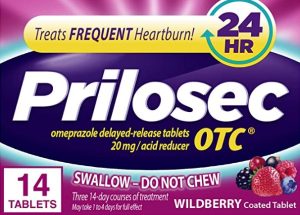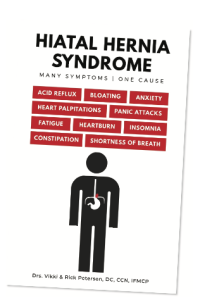Hiatal Hernia Syndrome: There is a Cure – Video
Hiatal Hernia Syndrome: There is a Cure!
A Video by Dr. Vikki Petersen
What you will learn about
Hiatal Hernia Syndrome can be effectively treated by addressing the root cause through a personalized program that includes normalizing and treating the gut, addressing structural effects, balancing and toning core muscles, and considering nerve involvement.
Summarized transcript
A range of symptoms
Hiatal hernia syndrome can cause seemingly unrelated symptoms such as acid reflux, shortness of breath, panic attacks, constipation, and bloating, and many people are not getting the help they need because doctors often say these symptoms have nothing to do with their hiatal hernia.
After being checked out at the ER and seeing multiple specialists, those with Hiatal Hernia Syndrome are often left feeling miserable and short of breath despite being told that their heart and lungs are fine.
Doctors often misdiagnose hiatal hernia syndrome as stress and prescribe antidepressants or anti-anxiety medication, without understanding that it is a condition where the stomach is pushed up on the diaphragm, and the only solution they offer is antacids for acid reflux.
Conventional medicine doctors manage symptoms of acid reflux without addressing the root cause, which is a hiatal hernia that causes the stomach to be squeezed and push acid up the esophagus, and while antacids may provide temporary relief, they compromise digestion and absorption of nutrients in the long term.
HHS: Root causes
Hiatal hernia syndrome can be resolved by addressing the root cause, which includes normalizing and treating the gut, addressing structural effects, balancing and toning core muscles, and considering nerve involvement.
Hiatal hernia syndrome is composed of 20 different symptoms and treating it with multiple medications creates long-term side effects, but it can be resolved by addressing the root cause.
To treat hiatal hernia syndrome, it is necessary to normalize and treat the gut, address structural effects such as the spasmed diaphragm, balance and tone core muscles, and consider nerve involvement.
The team at Root Cause Medical Clinic has identified common causes of hiatal hernia syndrome, which can lead to symptoms such as shortness of breath, heart palpitations, fatigue, and insomnia, and these causes can be both internal and external.
Food at the center
Food sensitivities and poor diet are internal causes of hiatal hernia syndrome, and testing for imbalances in the gut can alleviate symptoms such as bloating, gas, acid reflux, constipation, and diarrhea.
Food sensitivities, which are different from allergies, can cause a toxic impact on the body and are often found in those with hiatal hernia syndrome, and while there is no perfect test for determining food sensitivities, a modified Elimination Diet is highly effective, and poor diet is an internal cause of hiatal hernia syndrome.
The poor American diet, including refined and processed foods, sugar, and chemicals, is contributing to the increase in hiatal hernia syndrome, along with imbalances caused by infections in the gut.
Testing for imbalances such as bacteria, parasites, viruses, amoeba, protozoa, and toxins can make a huge difference in how your gut functions and can alleviate symptoms such as bloating, gas, acid reflux, constipation, and diarrhea.
Antacids: Not a solution

Internal factors such as nerves and musculature can cause hiatal hernia syndrome, and the vagus nerve can also contribute to neck pain.
The root cause of hiatal hernia syndrome varies for each individual and there is no one-size-fits-all solution.
Conventional medicine’s approach to acid reflux with antacids is not fair as it doesn’t resolve the issue and has negative side effects, and a tailor-made program is required to address the various symptoms of Hiatal Hernia Syndrome, including shortness of breath, heart palpitations, and panic attacks.
Size does not matter
Hiatal Hernia Syndrome can cause intense gut symptoms, even in small or subclinical hernias, and there are myths that there is no cure or natural therapy, but this is not true.
People with Hiatal Hernia Syndrome are often told their symptoms are all in their head and that there is no cure or natural therapy, but these are myths.
Hiatal hernias can be missed by conventional medicine due to their size and type, and even small or subclinical hernias can cause intense symptoms associated with the gut.
Going to the root cause

A personalized program is the cure for Hiatal Hernia Syndrome, and it involves addressing the root cause rather than relying on drugs, with an analogy of treating our bodies like we treat our cars.
People often ignore symptoms their body is trying to communicate to them, but root cause medicine emphasizes the body’s ability to heal itself and recognizes that it can become overburdened and stressed, leading to a lack of self-correction and healing.
Root cause medicine aims to avoid long-term use of antacids for acid reflux by addressing the underlying cause, rather than just treating the symptoms with medication.
Success rate treating HHS
Committing to lifestyle changes and identifying the root cause with Root Cause can successfully treat Hiatal Hernia Syndrome, resulting in symptom resolution and improved sleep and energy levels with an 85% success rate.
The root cause of hiatal hernia syndrome can be identified and successfully treated with the tools and experience of Root Cause, resulting in the resolution of symptoms such as heart palpitations, panic attacks, constipation, bloating, and improved sleep and energy levels with an 85% success rate if the patient is compliant and ready to make lifestyle changes.
Committing to financial and lifestyle changes is necessary to cure Hiatal Hernia Syndrome, with a high success rate but not for everyone.
The root cause hiatal hernia syndrome program is tailored to each individual with an integrated approach from a team of doctors, and a free 30-minute consultation is offered to determine if it’s a good fit for the patient.
Additional Resources:

Book a consultation with a specialist here

